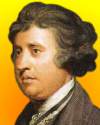 (source)
(source)
|
Edmund Burke
(12 Jan 1729 - 9 Jul 1797)
Irish-English statesman, orator and politician.
|
Science Quotes by Edmund Burke (13 quotes)
A light supper, a good night’s sleep, and a fine morning have often made a hero of the same man, who, by indigestion, a restless night, and a rainy morning would have proved a coward.
— Edmund Burke
A State without the means of some change is without the means of its conservation.
— Edmund Burke
…...
Education is the cheap defence of nations.
— Edmund Burke
In Hialmer Day Gould, New Practical Spelling (1905), 27
Facts are to the mind the same thing as food to the body. On the due digestion of facts depends the strength and wisdom of the one, just as vigor and health depend on the other. The wisest in council, the ablest in debate, and the most agreeable in the commerce of life is that man who has assimilated to his understanding the greatest number of facts.
— Edmund Burke
He that borrows the aid of an equal understanding, doubles his own; he that uses that of a superior elevates his own to the stature of that he contemplates.
— Edmund Burke
Collected, without citation, in Edge-tools of Speech (1886), 406. Also quoted, without citation, Ralph Waldo Emerson, 'Quotation and Originality', in Letters and Social Aims (1875, 1917), 178. Webmaster has not yet identified a primary source.
It is from this absolute indifference and tranquility of the mind, that mathematical speculations derive some of their most considerable advantages; because there is nothing to interest the imagination; because the judgment sits free and unbiased to examine the point. All proportions, every arrangement of quantity, is alike to the understanding, because the same truths result to it from all; from greater from lesser, from equality and inequality.
— Edmund Burke
In On the Sublime and Beautiful, Part 3, sect. 2.
Learning will be cast into the mire, and trodden down under the hoofs of a swinish multitude.
— Edmund Burke
Reflections on the Revolution in France (1790 ), 117.
Nothing tends so much to the corruption of science as to suffer it to stagnate; these waters must be troubled before they can exert their virtues.
— Edmund Burke
From 'A Philosophical Enquiry into the Origin Of Our Ideas of the Sublime and Beautiful' collected in The Works of the Right Honorable Edmund Burke (1756), 87.
People will not look forward to posterity, who never look backward to their ancestors.
— Edmund Burke
Society is indeed a contract. … It is a partnership in all science; a partnership in all art; a partnership in every virtue, and in all perfection. As the ends of such a partnership cannot be obtained in many generations, it becomes a partnership not only between those who are living, but between those who are living, those who are dead, and those who are to be born.
— Edmund Burke
Reflections on the Revolution in France (1790, 2005), 54.
The age of chivalry is gone. That of sophisters, economists and calculators has succeeded.
— Edmund Burke
Reflections on the Revolution in France (1790, 1868), 89.
The science of constructing a commonwealth, or renovating it, or reforming it, is, like every other experimental science, not to be taught a priori. Nor is it a short experience that can instruct us in that practical science, because the real effects of moral causes are not always immediate.
— Edmund Burke
Reflections on the Revolution in France, p. 53, ed. Pocock (1790).
The wild gas, the fixed air is plainly broke loose: but we ought to suspend our judgments until the first effervescence is a little subsided, till the liquor is cleared, and until we see something deeper than the agitation of the troubled and frothy surface.
[About the “spirit of liberty;” alluding to Priestley’s Observations on Air]
[About the “spirit of liberty;” alluding to Priestley’s Observations on Air]
— Edmund Burke
Reflections on the Revolution in France (1790), 8.
Quotes by others about Edmund Burke (1)
This quality of genius is, sometimes, difficult to be distinguished from talent, because high genius includes talent. It is talent, and something more. The usual distinction between genius and talent is, that one represents creative thought, the other practical skill: one invents, the other applies. But the truth is, that high genius applies its own inventions better than talent alone can do. A man who has mastered the higher mathematics, does not, on that account, lose his knowledge of arithmetic. Hannibal, Napoleon, Shakespeare, Newton, Scott, Burke, Arkwright, were
they not men of talent as well as men of genius?
In 'Genius', Wellman’s Miscellany (Dec 1871), 4, No. 6, 203.
 In science it often happens that scientists say, 'You know that's a really good argument; my position is mistaken,' and then they would actually change their minds and you never hear that old view from them again. They really do it. It doesn't happen as often as it should, because scientists are human and change is sometimes painful. But it happens every day. I cannot recall the last time something like that happened in politics or religion.
(1987) --
In science it often happens that scientists say, 'You know that's a really good argument; my position is mistaken,' and then they would actually change their minds and you never hear that old view from them again. They really do it. It doesn't happen as often as it should, because scientists are human and change is sometimes painful. But it happens every day. I cannot recall the last time something like that happened in politics or religion.
(1987) -- 


